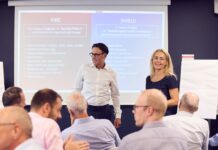“One moment can change a day, one day can change a life and one life can change the world.” ―Buddha
Presently leaders have adequate money but they don’t find adequate time to balance their work and life. Previously leaders had adequate time but they did not have adequate money to enjoy their lives. It seems the time has changed due to rapid growth in technology. There are leaders who find it difficult to find time to enjoy their lives with their family and friends. Although technology is a boon, it has become a bane globally. With the rapid growth in technology and social media, people enjoy spending their time with machines rather than with men. It is time to reverse this trend to ensure that the leaders find meaning in their lives. Although leaders intend to add value to themselves and others, there are human limitations. There are employees who keep struggling from work to office and back but rarely do they find time to spend time with their family and friends. Keeping this current global scenario in view, it is essential to ensure work-life integration rather than work-life balance to ensure employee motivation and employee engagement. Only when the employees are motivated and engaged will they be able to focus aggressively and contribute their best in the workplace to improve organizational bottom lines.
Due to the workplace pressures, the minds of leaders distracted and wandered which is not healthy for global organizations. Emphasizing on mindfulness helps greatly to overcome the wandering mind. There are innumerable advantages with mindfulness. It increases self-awareness and empathy. It increases clarity in thinking and perception. It improves attention and focuses on your goals. It enhances calmness, compassion, and connection. It improves soft skills. It enhances the quality of sleep which is a performance enhancement tool. Above all, it enhances your self-esteem.
Mindfulness helps enjoy every moment of life. It beats anxiety and helps overcome depression. It enhances the capacity, capability, and competence of all stakeholders. It emphasizes treating as human beings, not converting them into human doings. It increases productivity and performance in the workplace.
Impart Mindfulness Training
“Meditation is to the brain what aerobic exercise is to the heart.”
—Rick Hanson, PH. D.
Mindfulness training is a mental training to the mind the way physical training is to the body. You can improve your thought process and change your brain through mindfulness training the way you improve your physique through physical training. As you train your body through physical exercises you must train your mind through mindful practices. People often care more about their physical exercises but they must equally care about their mindful practices to unlock their inner potential. Imparting mindfulness training to employees helps immensely including developing resilience, collaborating with others and leading in the volatile, uncertain, complex and ambiguous world.
Steps to Slow Down
“There is more to life than increasing its speed.” —Mahatma Gandhi
You must slow down to enhance mindfulness. Use technology sparingly. Live in the present. Avoid thinking about your unpleasant past and your unpredictable future. Focus on core areas. Disconnect from gadgets and connect with people. Emphasize physical relations over virtual relations. Reflect a lot and enjoy with nature.
You can visually see physical clutter but you can only feel mental clutter. It requires extraordinary mental energy to clear your mental clutter. When you create more mental space, you will be able to fill it with positive energy. Hence, clear the clutter to create more positive vibes.
What is Mindful Leadership?
The term ‘leadership’ has several definitions as it creates a huge interest globally. However, there are very few definitions of mindful leadership. Mindful leadership is a focused leadership adopting eastern traditions secularly to increase self-awareness, compassion, and commitment while leading others. It is essential to emphasize mindful leadership with increased volatility, uncertainty, complexity and ambiguity in the current global business environment.
Mindful leadership can be defined as the ability to lead various stakeholders with an emphasis on self-awareness and spiritualism. It is the ability to lead from the inside out, not from the top down. It is the ability to lead through soft leadership with people-orientation without compromising task-orientation. It is the ability to lead with compassion to make a difference in the lives of all stakeholders including employees, customers, and shareholders. It is to lead by being sensitive to self and others. It is to lead differently, not indifferently. In a nutshell, mindful leadership is the ability to lead with passion and purpose by living in the present moment.
Mindful leaders are often connected with their stakeholders. They lead by example. They learn from others and imbibe great qualities from others irrespective of rank and position. Leaders must remain calm in the eye of the hurricane which is possible through mindful leadership.
How to Excel as a Mindful Leader?
“By letting it go it all gets done. The world is won by those who let it go. But when you try and try, the world is beyond winning.” —Lao Tzu
When you write mindfully, you become a mindful writer. When you listen mindfully, you become a mindful listener. When you read mindfully, you become a mindful reader. When you speak mindfully, you become a mindful speaker. When you lead mindfully you become a mindful leader. Precisely, mindfulness is closely connected with focus. Hence, mindful leaders are clearly focused on leaders. To grow as a mindful leader, you must introspect regularly. Analyze yourself, understand your emotions, manage your emotions, understand the emotions of the people around you, and manage their emotions to achieve organizational goals and objectives. Here are some tools and techniques to excel as a mindful leader
- Set your goals and focus on them clearly.
- Don’t react to events but respond to them positively and proactively.
- Don’t get victimized by your unpleasant thoughts from the past.
- Use your memories but don’t allow them to use you.
- Stay away from distractions. Take up one task and do it instead of undertaking many tasks at a time. That means avoid multitasking, working and living on autopilot. Clifford Nass remarked, “It turns out multitaskers are terrible at every aspect of multitasking. They’re terrible at ignoring irrelevant information; they’re terrible at keeping information in their head nicely and neatly organized, and they’re terrible at switching from one task to another.”
- Practice compassionate listening. Be compassionate because the energy of compassion is very strong. Dalai Lama rightly remarked, “If you want others to be happy, practice compassion. If you want to be happy, practice compassion.”
- Use technology judiciously especially social media. Stay away from gadgets for some time every day.
- Don’t worry about tomorrow. Tomorrow will take care of itself. Learn to live in the present. If you live in the present happily, you can live in the future happily.
- Let go off your unpleasant past.
- Focus on prayers.
- Focus on your breath. Inhale and exhale consciously. Do meditation daily for 15 to 20 minutes to improve executive functions such as sustaining attention and diminishing distractibility.
- Listen to soft music and sounds of nature to energize yourself. Get creative.
- Journal regularly.
- Take feedback at the end of each day to improve and do better the next day.
- Spend some time daily to step back to enhance your focus, calm and clarity in your life.
Meditation requires a positive and peaceful mind. Don’t endeavor to silence your thoughts because silencing the thoughts is also thought. Precisely, remember your past, learn from your past to enjoy your present, and reimagine your future to lead a pleasant and happy life.
Learn from Sufferings
“We shall draw from the heart of suffering itself the means of inspiration and survival.” ―Winston Churchill
You can learn a lot from suffering. Remember, in the ash of suffering a phoenix can be born. When you look at Mother Teresa she suffered a lot during her initial years in India. She walked the streets without any financial support and resources. Such suffering made her dedicate her entire life to eliminate the sufferings of the poor and downtrodden.
Work-Life Balance versus Work-Life Integration
“In theory, there is no difference between theory and practice. In practice there is.” —Yogi Berra
As the term indicates clearly, work-life balance outlines balancing both work and life—that is balancing both professional life and personal life. On the other hand, work-life integration outlines including life as part and parcel of work—that is including personal life into your professional life. When people want to pursue their hobbies and games, they can do so during office hours as time is stipulated for this. Globally renowned companies including Google, Apple, Virgin, Facebook, IBM, General Mills, Blackstone, McKinsey & Company, Deutsche Bank, Procter & Gamble, Medtronic, Astra Zeneca, Goldman Sachs, and the Huffington Post emphasize work-life integration. In the case of work-life balance, hobbies and games are pursued after completion of the office hours. The current world calls for integrating work into your life–and vice versa.
This is a Crazy World!
“The unexamined life is not worth living.” —Socrates
During my five decades of my life journey, many things have changed drastically. Television has changed social relations and equations. Before the advent of television, people interacted with others physically. After the advent of television, people decreased their physical interaction and started viewing the idiot box. Gradually joint families have been replaced by nuclear families. The Internet has further revolutionized the world. It connected people globally and converted the world into a global village. Presently people are glued to mobiles with less physical interaction. My younger son came on vacation to India from America in May 2017 to spend his time with us and his elder brother. However, I found my two sons started chatting through smartphones by sitting together physically. I advised them to interact physically instead of virtually. They were physically sitting beside but one was glued to laptop another with the smartphone. That is how the world has changed. The changes that have taken place in the last ten years have revolutionized the world. People get stressed out leading to an increased rate of suicides and family breakups. This is not a healthy sign in the long run. It is time to focus on mindfulness and wellness to connect with others physically and spiritually.
Enjoy the Journey of Your Life!
“Each morning we are born again. What we do today is what matters most.” —Buddha
We live in a 24×7 world and bombarded with tons of information. We have the practice of congratulating leaders who work hard and burnout. In fact, our culture taught us wrong things to burnout to be successful.
Mindfulness leadership is not a silver bullet. However, when leaders lead mindfully they will be able to lead with energy and enthusiasm and eliminate distractions with self-awareness to achieve organizational goals and objectives.
We must balance between ancient wisdom and modern wisdom. We must strike the right balance between the east and the west. We must know how to leverage technology judiciously. We must emphasize on humanity and generosity globally to take our civilization to great heights.
Life is not a cakewalk. Life is full of challenges. You cannot control the external events but you must develop the right attitude to overcome external challenges by responding to them positively and proactively.
There are well-known celebrities who died of cancer including Steve Jobs, Bob Marley, Ronald Reagan, and Frank Zappa. There is no meaning to life if people don’t spend their personal time with others. Although the destination is important it is the journey that matters at the end. Life is short and make it sweet and memorable. Ensure that there are no regrets on the deathbed for not following your passions. Hence, allocate your time adequately to balance your personal, professional and social life to lead a happy and pleasant life and provide meaning to your life.
“In the end, these things matter most: How well did you love? How fully did you live? How deeply did you let go?” ―Buddha
About the Author
 Professor M.S. Rao, Ph.D. is the Father of “Soft Leadership” and Founder of MSR Leadership Consultants, India. He is an International Leadership Guru with 38 years of experience and the author of over 45 books including the award-winning ‘21 Success Sutras for CEOs’ URL: http://www.amazon.com/21-Success-Sutras-Ceos-Rao/dp/162865290X. He is a C-Suite advisor and a sought-after keynote speaker globally. He brings a strategic eye and long-range vision given his multifaceted professional experience including military, teaching, training, research, consultancy, and philosophy. He is passionate about serving and making a difference in the lives of others. He trains a new generation of leaders through leadership education and publications. His vision is to build one million students as global leaders by 2030 URL: http://professormsraovision2030.blogspot.in/2014/12/professor-m-s-raos-vision-2030-one_31.html. He advocates gender equality globally (#HeForShe). He was honored as an upcoming International Leadership Guru by Global Gurus URL: https://globalgurus.org/upcoming-leadership-gurus/. He coined an innovative teaching tool―Meka’s Method; leadership training tool―11E Leadership Grid; and leadership learning tool―Soft Leadership Grid. He invests his time in authoring books and blogging on executive education, learning and leadership. Most of his work is available free of charge on his four blogs including http://professormsraovision2030.blogspot.com. He is a prolific author and a dynamic, energetic and inspirational leadership speaker. He can be reached at msrlctrg@gmail.com.
Professor M.S. Rao, Ph.D. is the Father of “Soft Leadership” and Founder of MSR Leadership Consultants, India. He is an International Leadership Guru with 38 years of experience and the author of over 45 books including the award-winning ‘21 Success Sutras for CEOs’ URL: http://www.amazon.com/21-Success-Sutras-Ceos-Rao/dp/162865290X. He is a C-Suite advisor and a sought-after keynote speaker globally. He brings a strategic eye and long-range vision given his multifaceted professional experience including military, teaching, training, research, consultancy, and philosophy. He is passionate about serving and making a difference in the lives of others. He trains a new generation of leaders through leadership education and publications. His vision is to build one million students as global leaders by 2030 URL: http://professormsraovision2030.blogspot.in/2014/12/professor-m-s-raos-vision-2030-one_31.html. He advocates gender equality globally (#HeForShe). He was honored as an upcoming International Leadership Guru by Global Gurus URL: https://globalgurus.org/upcoming-leadership-gurus/. He coined an innovative teaching tool―Meka’s Method; leadership training tool―11E Leadership Grid; and leadership learning tool―Soft Leadership Grid. He invests his time in authoring books and blogging on executive education, learning and leadership. Most of his work is available free of charge on his four blogs including http://professormsraovision2030.blogspot.com. He is a prolific author and a dynamic, energetic and inspirational leadership speaker. He can be reached at msrlctrg@gmail.com.
Note: This article is an adapted excerpt from my book titled, “See the Light in You: Acquire Spiritual Powers to Achieve Mindfulness, Wellness, Happiness and Success.” His Holiness Dalai Lama has written a foreword for this book.



































